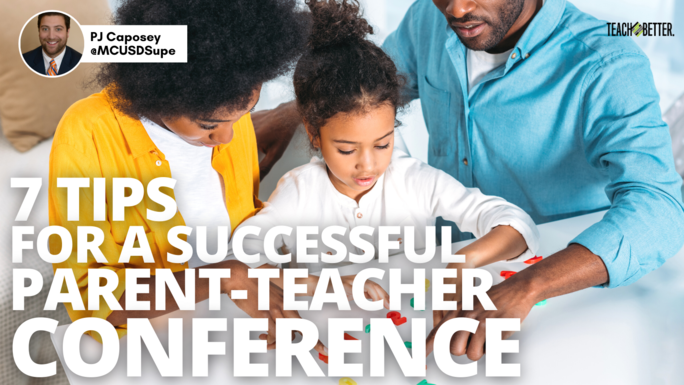TL;DR:
- Great teachers use conferences as an opportunity to talk about any changes since the last parent contact.
- Conferences are an outstanding opportunity to confirm the preferred communication method of the parent.
- Parents and teachers should partner together to create a plan to help the student.
- Share who the student is when their parents aren’t around—what is their character?
7 Tips for a Successful Parent-Teacher Conference
Parent-Teacher Conferences (PTC) received a JOLT to the system this year. As with most things education, the PTC process was turned on its proverbial head with Zoom conferences this year and in many cases, there was much more consistent parent-teacher communication. With all things that changed this year, schools and educators must decide whether this change will be a launching plan to continued revisions and hypotheses or whether this change will revert back to the traditional behavior as we experience the COVID yo-yo effect.
Here are a few things I believe everyone can agree on.
The relationship between the parent of our students and the teacher is a vital cog to the school experience. These relationships SHOULD NOT solely rely on the parent-teacher conference, but the PTC is our most systematic approach to facilitating this relationship.
Despite their importance, most schools and leaders do not set expectations or provide training for the teachers on how to conduct a successful PTC. From the perspective of a former teacher, current administrator, and demanding dad (who I have been told is a bear to have in a PTC) I have constructed a template that, if followed, should make PTCs productive, relationship-enhancing events.
The purpose of a PTC is simply to better engage the family in the education of their child. Engaging the parent means helping the parent understand how the parent can serve as a better partner in their child’s education. Share on XThe secret to all great PTCs is that they are entirely dependent upon the teacher’s actions well before the meeting ever takes place. Here is how you do it:
Tip #1: Review Previous Communication or Lack Thereof
If the conference is the first time you are talking to or communicating with a parent on an individual basis, then expect the conference to be less productive and have a heightened level of tension. Most PTCs are at least six weeks into the school year. That means 15 percent of the school year has gone by before the first personal interaction if that is how we are using the PTC.
Great teachers use this conference as an opportunity to talk about changes they have made or the student has made since the last parent contact. Additionally, if parent contact has been attempted and replies are scarce, this is an outstanding opportunity to confirm the preferred communication method of the parent.
Tip #2: Review Outcomes
A parent should leave with a clear understanding of what their child has been learning and will be learning in the future. This does not mean you tell them about the ‘Rainforest Unit.’ This means that you talk to them about the standards, skills, and desired outcomes that drive your class.
Here is the rub, if grades are not reflective of what a student knows and is able to do, these conversations are ROUGH. (Hence, my reputation.) It is very uncomfortable to tell a parent that his or her child is reading at the 7th grade level in 3rd grade, but getting a C because of some compliance work that was not done appropriately.
Tip #3: Articulate Grades
Grades mean much to parents. Probably way too much. This was what they remember about school and this typically drives our communication to our parents. We have created this as the primary measure of student success whether we believe it to be or not.
This conversation is an opportunity to explain how you grade to your parents, but danger lurks if you do not sincerely believe in your grading system. Worse is when you cannot articulate or defend current grading practices. Grading for behavior, issuing tons of extra credit, have students receiving A’s, but performing far below standard or vice versa are areas that will lead to increased tension during these conversations.
Grades must mean something and measure what parents have been told is important in terms of outcomes. Additionally, artifacts should be available to show parents their student’s performance compared to the expected standard that you can clearly explain. In one of my worst PTCs I have witnessed, the teacher using their own rubric could not articulate why a certain grade was issued when a parent inquired. There is nothing worse than not being able to articulate what a rubric says or realizing during the conference that your rubric is not strong.
[scroll down to keep reading]
Tip #4: Use Comparative Data
Most parents want to know where their student is in comparison to their peers so national benchmarking data is generally appreciated and answers many questions. When students struggle in these comparisons, high-quality teachers tend to have a comprehensive plan as to what they are going to do to help the student. (If you have not done this in the past, please do.)
A common pitfall here is the desire to simply congratulate the parents of the students doing well. That is not okay. For example, my children are fortunate to score upwards of the 80th percentile on most of these tests. When I have inquired why my student started in the 88th percentile (for example) in 2nd grade and is now in the 77th in 5th grade, I should not be reassured that the 77th percentile is great and I have nothing to be concerned about.
When we say ALL students, we must mean ALL students. Students scoring above average deserve to be pushed and grow as much as any other student. And you should have a plan for doing so.
Tip #5: Share Your Goals for the Student for the Rest of the Year.
Any PTC that ends with the parent believing that the teacher is as committed to their student’s success as they are is a resounding success.
In order to get to this end, a teacher must have invested time and energy into creating the desired outcomes for that student in the future (hopefully WITH the student) ahead of time. This act demonstrates MUTUAL responsibility for the student’s growth and gives the parent something to actively monitor. Most parents want to leave a PTC not only with information, but empowered to act in some productive way to support their student’s growth.
Tip #6: Share the Student’s Character
Everyone wants to know who their student is when they are not around. Parents of students who receive discipline in class or in school already may have an idea. While those students may be time consuming, they are usually the exception, not the norm.
For the 85% of students that do exactly what they should on a daily basis this is a time to explain who their child is besides someone who does not get in trouble. Is the student a leader, follower, enjoys helping others, or something else that can demonstrate you really know their student?
The parent may not have any idea that their child exhibits those skills or maybe they have just never had their efforts as a parent validated. A parent may well understand that their student struggles in reading, but to be able to understand that they are a natural leader may mean the world to a parent. Said differently, just because something is readily apparent to you, does not mean that the parent would also be aware of this positive behavior. Moreover, this also demonstrates to the parent that you see their child as a person beyond just a student.
Tip #7: Partner with Parents
It should never be lost that the PTC is not intended to be the first or last parent interaction throughout the year, but it just may be the most meaningful. The purpose of a PTC is simply to better engage the family in the education of their child. Engaging the parent means helping the parent understand how they can serve as a better partner in their child’s education.
Think about it. You will never have a better chance than you do during this meeting.
This is VERY formal, but I like to encourage teachers to consider three I WILL statements to conclude every PTC. This is a commitment from the teacher, student, and parent as to what ‘I WILL’ do to improve the educational experience of the student throughout the next months of the child’s schooling experience.
About PJ Caposey
Dr. PJ Caposey is an award-winning educator, keynote speaker, consultant, and best-selling author of eight books who currently serves as the Superintendent of Schools for the nationally recognized Meridian CUSD 223 School District in Northwest Illinois. You can find PJ on most social media platforms as MCUSDSupe.


